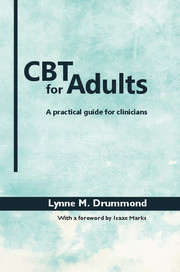Book contents
- Frontmatter
- Dedication
- Contents
- List of tables, boxes, figures and case examples
- Foreword
- Preface
- Structure of the book
- List of abbreviations
- 1 Introduction
- 2 Assessment
- 3 Rules of reinforcement and practical examples
- 4 Social skills training
- 5 Relationship, communication and sexual skills training
- 6 Phobic and social anxiety
- 7 Treatment of obsessive–compulsive disorders
- 8 Depression
- 9 Generalised anxiety disorder and panic
- 10 Body dysmorphic disorder and the somatic symptom and related disorders
- 11 Eating disorders
- 12 Addictive behaviour
- 13 Schizophrenia and the psychoses
- 14 Personality disorder
- 15 CBT in combination with other therapy
- Glossary
- Index
- Frontmatter
- Dedication
- Contents
- List of tables, boxes, figures and case examples
- Foreword
- Preface
- Structure of the book
- List of abbreviations
- 1 Introduction
- 2 Assessment
- 3 Rules of reinforcement and practical examples
- 4 Social skills training
- 5 Relationship, communication and sexual skills training
- 6 Phobic and social anxiety
- 7 Treatment of obsessive–compulsive disorders
- 8 Depression
- 9 Generalised anxiety disorder and panic
- 10 Body dysmorphic disorder and the somatic symptom and related disorders
- 11 Eating disorders
- 12 Addictive behaviour
- 13 Schizophrenia and the psychoses
- 14 Personality disorder
- 15 CBT in combination with other therapy
- Glossary
- Index
Summary
In recent years effective cognitive–behavioural therapies have become widely used. They can help many individuals to overcome a broad range of problems in order to live normal lives. As there are few easy guides to such therapies for would-be therapists, this new book is most welcome. Clinicians wishing to apply behavioural and cognitive procedures can learn more from how-to-do-it guidance than from theoretical disquisitions. In this easy-to-read book therapists can find a wide variety of case histories of therapy in sufficient detail to use similar methods in their own work. The book contains many examples of careful treatment applications that will allow practitioners to skilfully meet the needs of their own patients. An important advance concerns self-help for anxiety disorders. Self-exposure can be so successful that, as this book notes, in most individuals with anxiety disorder clinician-accompanied exposure is unnecessary. The therapist's main task is to encourage the patient to work out and complete suitable exposure targets and to monitor progress towards their achievement. Lynne Drummond gives clear guidance on this topic.
Also mentioned is a National Institute of Mental Health (NIMH) multicentre controlled study of the treatment of depression. In that study interpersonal therapy was at least as effective as cognitive therapy. The cognitive part of cognitive therapy may be redundant, the core element to the various successful brief psychotherapies for depression being task-oriented problem-solving. However, cognitive therapy on its own can, too, be therapeutic.
Other relatively recent knowledge concerns medication combined with exposure in some individuals with anxiety disorders. In a large controlled study of agoraphobia with panic in London and Toronto, high doses of benzodiazepines interfered with exposure in the long term and should therefore be avoided. In contrast, in additional work, antidepressants did not interfere with exposure and indeed could enhance it when depression complicated the phobia/panic or obsessive–compulsive problem. Moreover, a variety of antidepressant drugs can be used in such cases as no particular class is yet known to be specific to any given anxiety syndrome.
- Type
- Chapter
- Information
- CBT for AdultsA Practical Guide for Clinicians, pp. xiii - xivPublisher: Royal College of PsychiatristsPrint publication year: 2014



